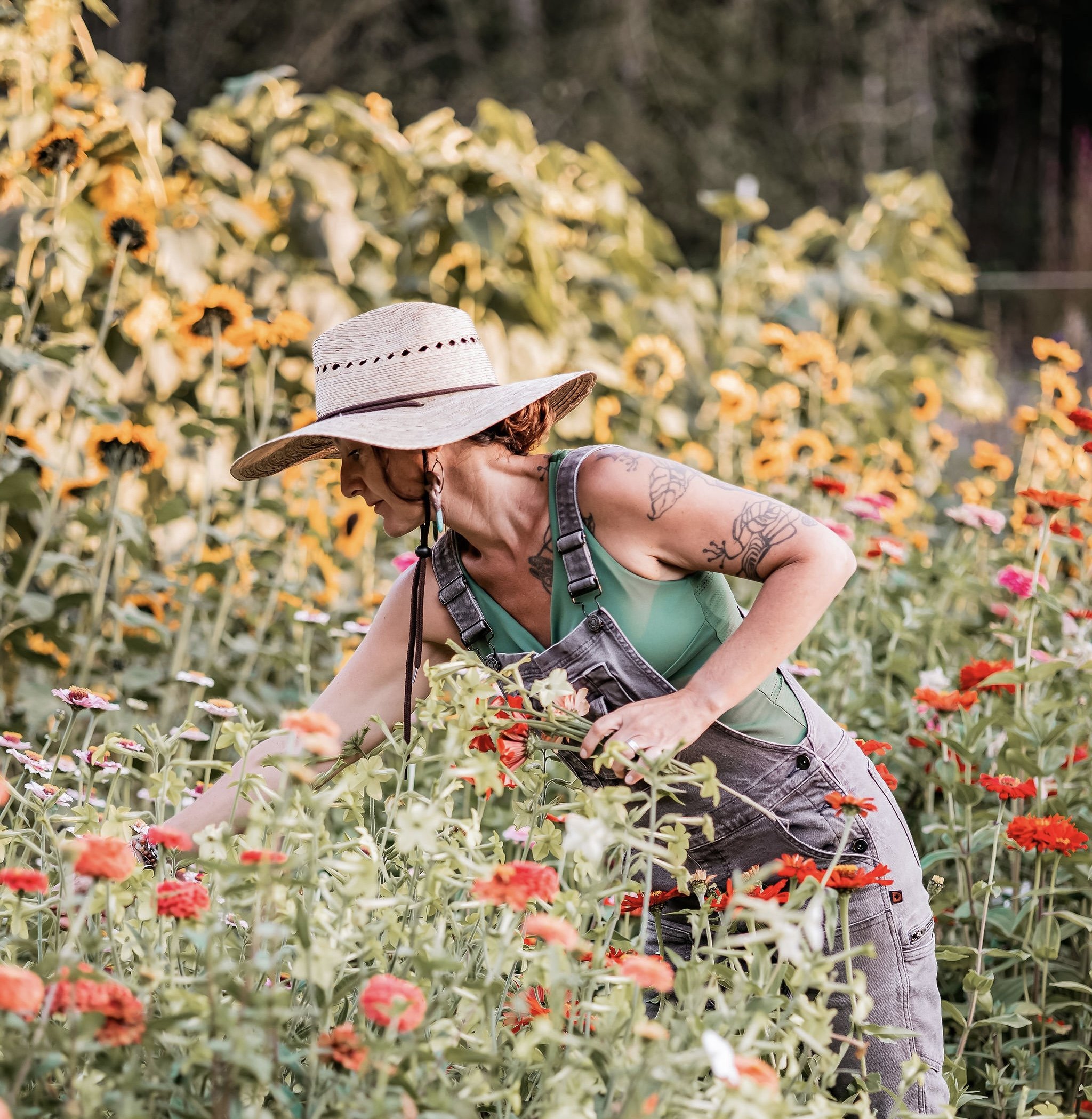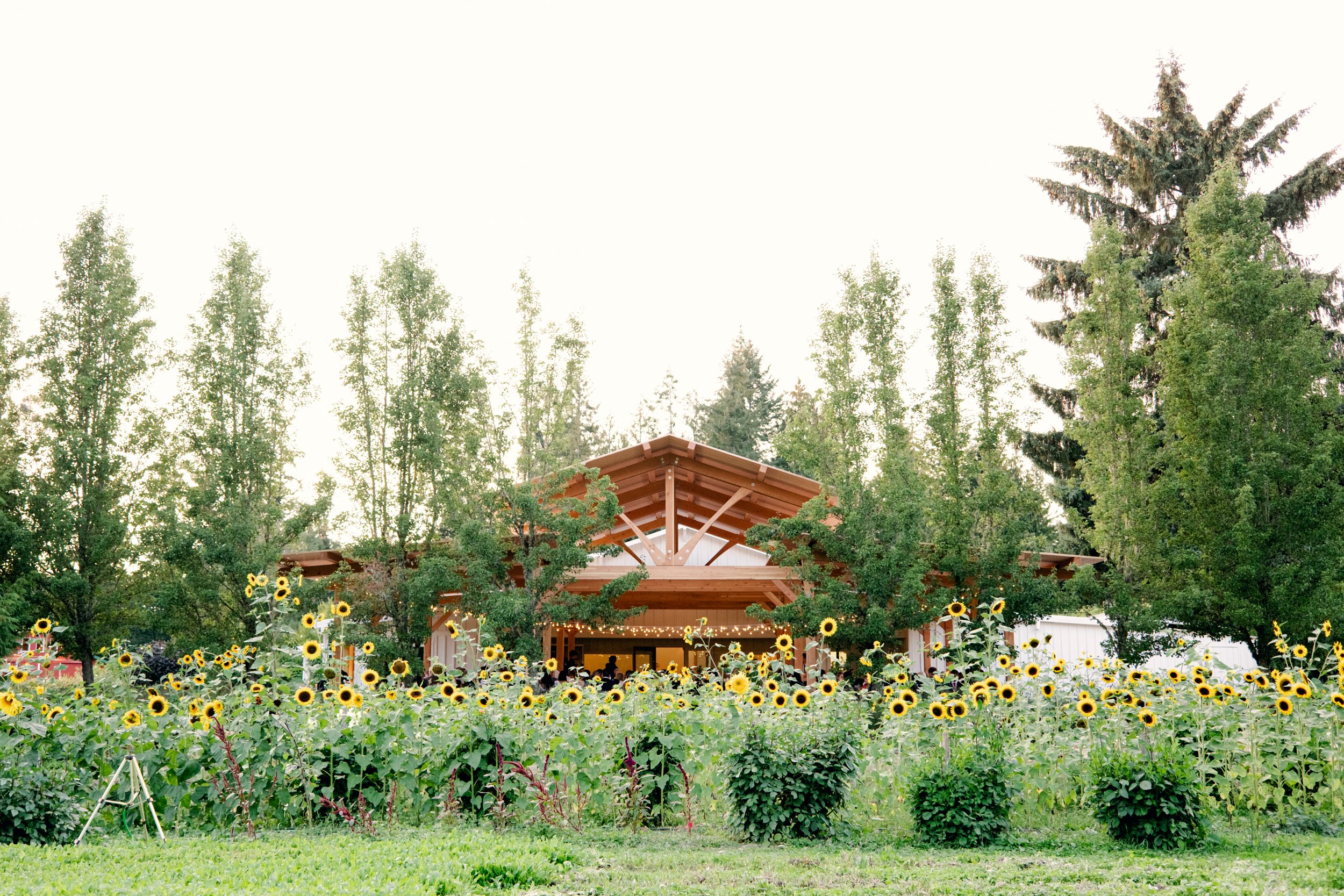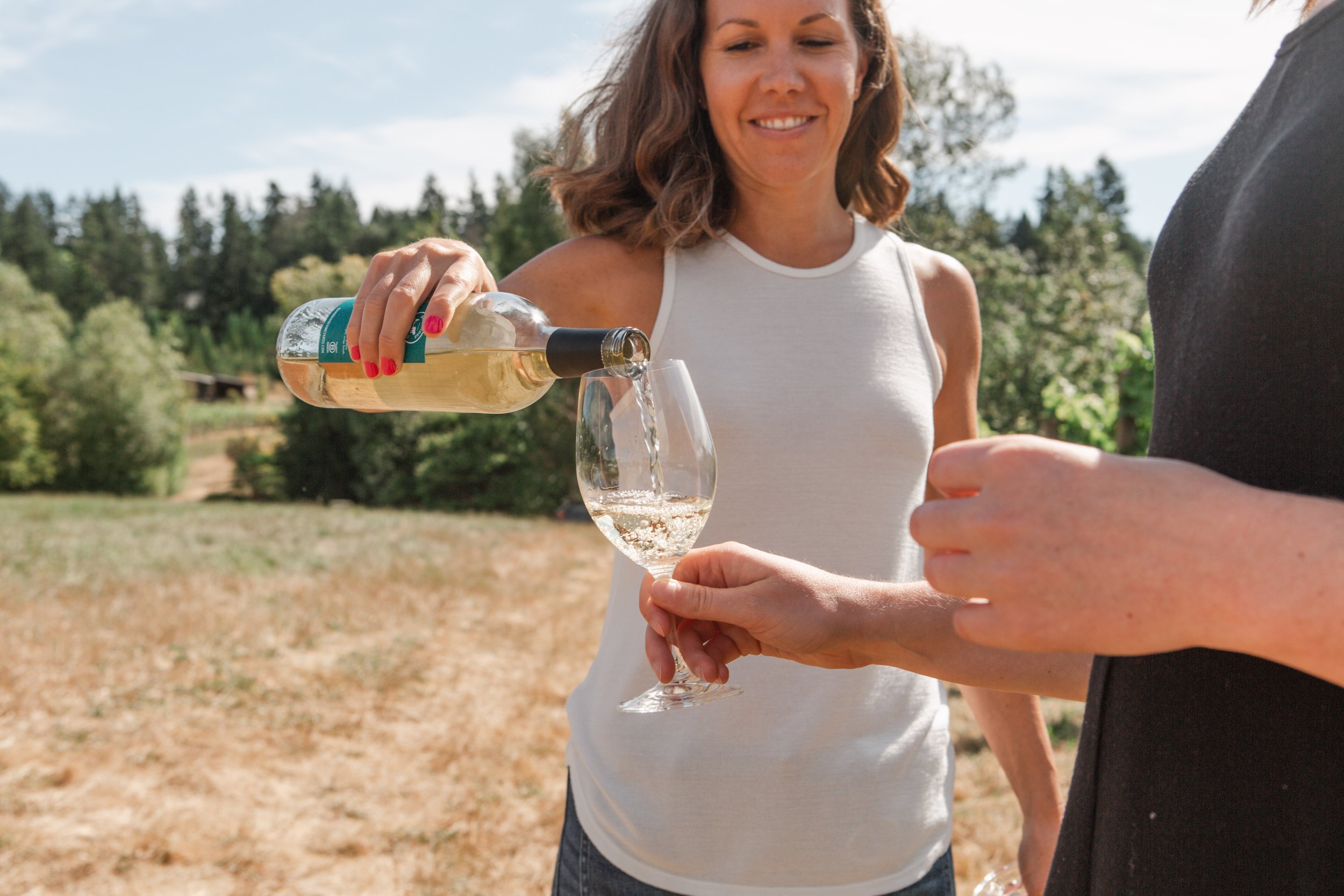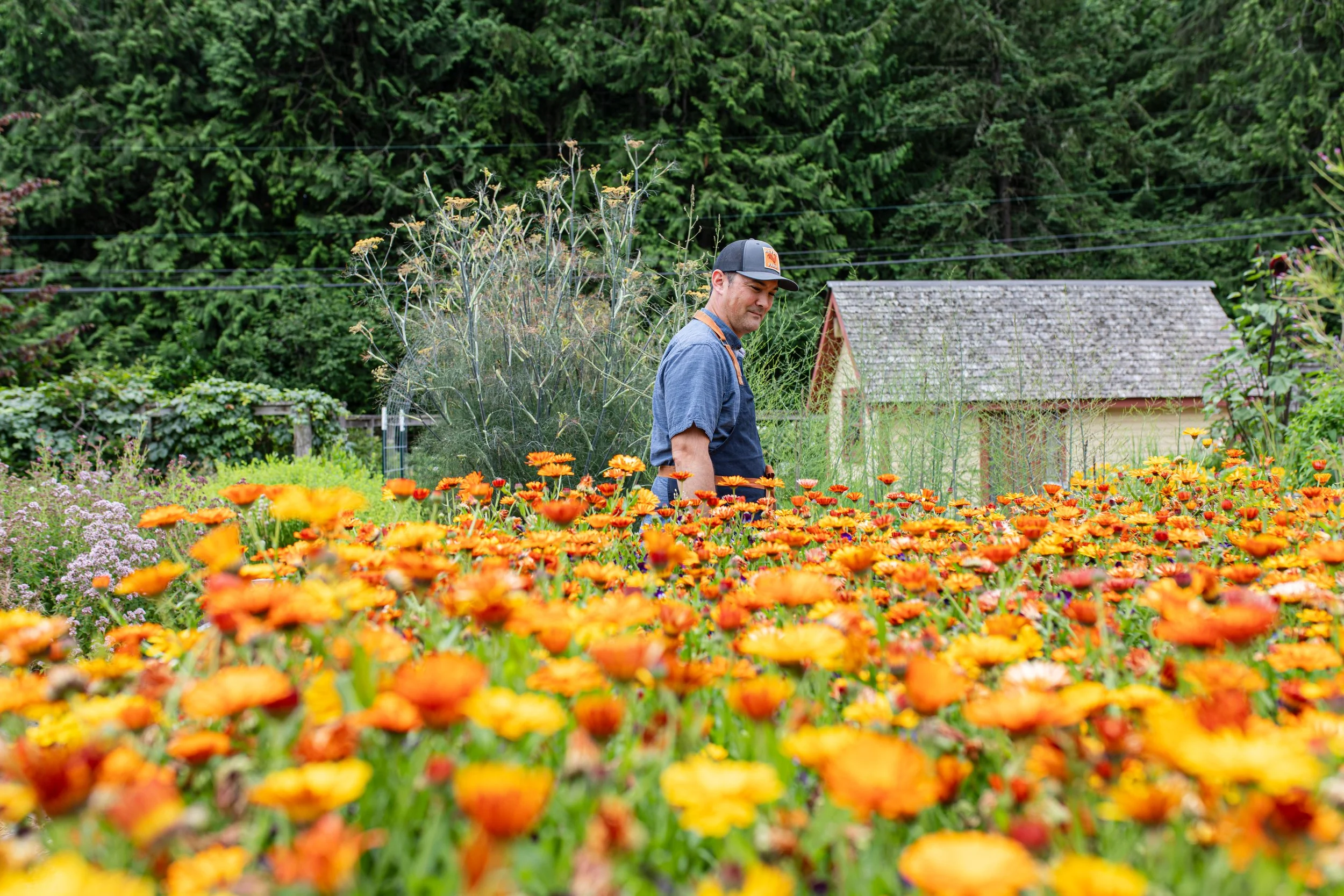be our guest
CULTIVATION AND HOSPITALITY GO HAND-IN-HAND ON KITSAP’S FAMILY FARMS
Words by David Albright
Chef Tadao Mitsui, Heyday Farm (Photo: Brittany Kelley)
It’s no exaggeration to say that Karen Becker’s life was changed by a visit to Petal and Pitchfork Farm in Poulsbo a half decade ago. She’s a self-described “city girl,” but when she looks around at the rows of crops she tends to as a volunteer at that same farm today, she sees things in a whole new light. “I’m just hooked,” she said, “it’s so wonderful to be out here each day. It’s therapeutic, it’s beautiful.”
Agritourism is defined as “the practice of touring agricul- tural areas to see farms and often participate in farm activities.” But for owners of the small farms that make up Kitsap County’s farm community, it’s much more than that. It’s an opportunity to connect people with a way of life and a sense of connection to the earth that many of them fear is rapidly fading.
Tadao Mitsui grew up on a 35-acre farm in Kingston that his grandparents owned, and he remembers visiting other local farms to help pick berries. Today he’s the owner and chef of Heyday Farm on Bainbridge Island, which offers gorgeous event spaces as well as fine dining Thursday and Friday evenings at its weekly community dinners. It also operates a wholesale bakery.
Visiting Heyday Farm is like stepping into an agricultural dreamland. The grounds are meticulously groomed and the garden beds overflow with ripe produce. Mitsui estimates that 80% of what they serve at their restaurant comes from the farm, and guests are invited to stroll through the gardens before or after their meal. On the day we visited, asparagus was ready for harvest. Not the dried out ones you’ll find bundled up in a typical grocery store, Mitsui is quick to point out, “they are just so much more sweet, tender and moist when they are fresh like this.”
Dinner guests at Heyday Farm dine in the historic farmhouse, where the menu changes every week based on what’s coming out the garden. The menu tonight features—you guessed it—asparagus as part of the grain dish, combined with mushroom quinoa, golden beets and arugula pesto.
Heyday Farm is part of a long history of farming in Kitsap County—even their name harkens back to a bygone age. Agriculture was a mainstay of the local economy for generations but has been on the decline in recent years. Between 1997 and 2017 the county lost 61% of its farmland, according to the USDA Census of Agriculture.
On another part of the island, Bainbridge Vineyards represents both the promise and the peril of maintaining a farm in a fast-growing region like Kitsap. Their original site was established just outside of Winslow in 1977. Today that site is known as “Vineyard Lane,” a housing development whose only connection to agriculture is the name on the street sign and the fertile soil that’s now trapped beneath concrete foundations.
But the business was able to relocate and today the winery is open to visitors just a few miles up from that original site, where guests can sip wine on an outdoor patio while gazing out on the rows of grape vines. Due to the cooler Maritime Northwest climate, owner Betsey Wittick says the grapes they grow make a lighter, more delicate wine as compared to the bigger heavier reds that come from warmer regions like Eastern Washington. “We want people to come to the farm and have a sense of something that’s from here.” Wittick says, explaining why it’s important for them to grow their grapes on site, “It delivers that taste of place.”



In Poulsbo, Courter Country Farm and Farm Kitchen both offer unique opportunities for those looking for a place to stay, with Airbnbs integrated into their operations. Farm Kitchen even dedicates a few rows in their vegetable garden for guests to harvest from. “We really encourage guests to wander the property, spend time outside and have us take them on a tour if they’re interested,” Farm Kitchen’s Lise Fernow says. “Or they can just have a totally quiet, peaceful stay here on the property.”
Farm Kitchen also hosts u-pick flower events that they call Flowers and Fika—a nod to the Scandinavian heritage of Poulsbo—and they recently completed a massive pavilion made from Douglas fir timber. The structure helps to extend their event space outdoors, overlooking rows of dahlias.
Courter Country Farm, which is open to the public every Friday, offers the chance to sleep under the stars in a glass-walled cabin. Think working greenhouse meets glamping, but with the comfort of a double bed and a heated mattress pad. In the morning you can wander through the grounds saying hello to the goats, alpacas or bunnies, which owner Denise Courter says are the most popular attraction at the farm. “The bunnies are the favorite, hands down,” she says with a laugh, “it’s always the bunnies!”
Courter Country Farm in Poulsbo was one of eight farm sites to host the first annual Kitsap Farm Tour in August. The tour is an initiative of the Kitsap Agritourism Coalition and supported by WSU Kitsap Extension, Visit Kitsap Peninsula and State of Washington Tourism. (Photo: Denise Courter)
When you ask any of these farmers why they enjoy bringing the public onto their land, they all point to a feeling of connection. The connection between farmer and visitor, between child and animal, or between a community and the food they eat. “They come here, and they see what’s going on and they cultivate a relationship with the land. It’s really special.” Petal and Pitchfork’s, Stacy Marshall says.
Kitsap County farms are distinct from farms in other agritourism hotbeds like Skagit or Jefferson counties, where the farms are much larger. Here you won’t find acres and acres of a single crop growing in tidy rows. You’re more likely to find down-to-earth, family-run operations that incorporate a mix of uses. Jess Sappington with the WSU Extension Regional Small Farms program says that’s part of the appeal. “It’s a unique thing in Kitsap, we have a lot more smaller, homestead farms.”
For those who care to help maintain this way of life, visiting a farm is another way we can show our support for those who keep them going. Bainbridge Vineyards’ Betsey Wittick puts it like this, “There’s different ways people can participate in community—you can run for office, you can volunteer or you can do a low-paying but rewarding job like farming! That’s how we all add to a better community.”
Get a Gourd
Pumpkin patches are a great opportunity to visit a local farm. This fall, skip the giant piles outside the grocery store and go straight to the source.Courter Country Farm
Poulsbo
Fridays in October
10 a.m. to 3 p.m.
Pheasant Fields
Silverdale
Monday through Saturday
10 a.m. to 6 p.m.
Sundays in October
10 a.m. to 6 p.m.
Suyematsu Farms on Day Road
Bainbridge Island
weekends: 10 a.m. to 6 p.m.
weekdays: 1 p.m. to 6 p.m.
Winney Farm
Bainbridge Island
Harvest Fest: September 30
7 a.m. to 7 p.m. daily in October


